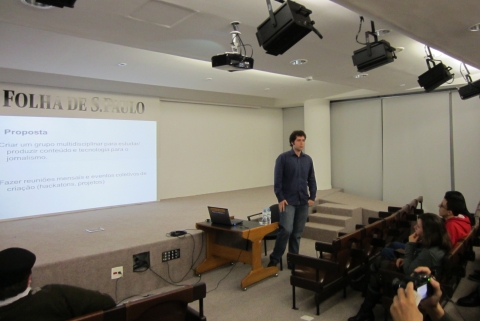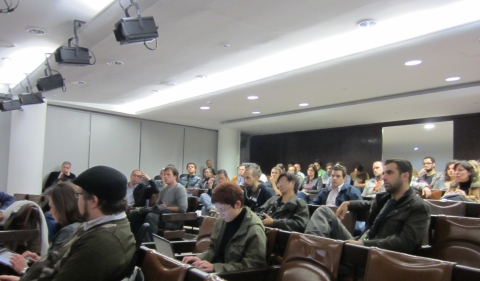
Knight Fellow Gustavo Faleiros organized the first meeting of Hacks/Hackers Sao Paulo at the Folha de Sao Paulo newspaper headquarters.

Around 50 journalists and technologists attended Sao Paulo's first Hacks/Hackers meetup.
On Monday, July 16, I launched Brazil’s first Hacks/Hackers chapter in Sao Paulo. The initiative has the support of ABRAJI (the Brazilian Investigative Journalism Association), the local offices of the Open Knowledge Foundation and W3C (the World Wide Web Consortium). The opening session was held at the daily Folha de Sao Paulo’s headquarters.
During the last couple of months, I have been working on digital data projects for media as part of my Knight International Journalism Fellowship. In June, during the United Nations’ Rio+20 conference on climate change, I launched InfoAmazonia, a platform that combines journalism and data visualization. This experience showed me the importance of bringing journalists closer to developers and other professionals who are involved in innovative media projects.
Nearly 50 people attended the Hacks/Hackers Sao Paulo launch. The sessions gave journalists a chance to showcase how they are using data and digital tools.
Marcelo Soares from Folha de Sao Paulo talked about his data blog;
José Roberto Toledo from Estado de Sao Paulo explained why the newspaper decided to create a data-journalism team in the newsroom;
Juliana Mori from O Eco, the developer and manager of InfoAmazonia, described that project and our previous collaboration on a crowd-sourced map of Sao Paulo called mapasColetivos;
Juan Torres from Correio da Bahia described his project, which was a finalist in the first International Data Journalism Awards.
Journalist Fabiano Angélico helped kick off the Hacks/Hackers meetup with a presentation that analyzed the opportunities Brazil’s new Freedom of Information law offers. “There is still a long way to go between access to information and analysis that finds the relevance of that information. That is why I think an initiative like Hacks/Hackers is important,” he said.
Participants talked about the presentations at the end of the meeting and agreed to meet monthly. We have already set up a MeetUp Group, which so far includes 63 members. The next step: identifying knowledge that journalists and programmers can share and coming up with project ideas that the group can tackle to help introduce new tools for media in Brazil - and possibly all of Latin America.
Hacks/Hackers, founded by entrepreneurial journalist Burt Herman, aims to bridge the gap between journalists and technology. Starting up Brazil’s first chapter in Sao Paulo is a great responsibility and, above all, an incredible opportunity to experiment and advance journalism.